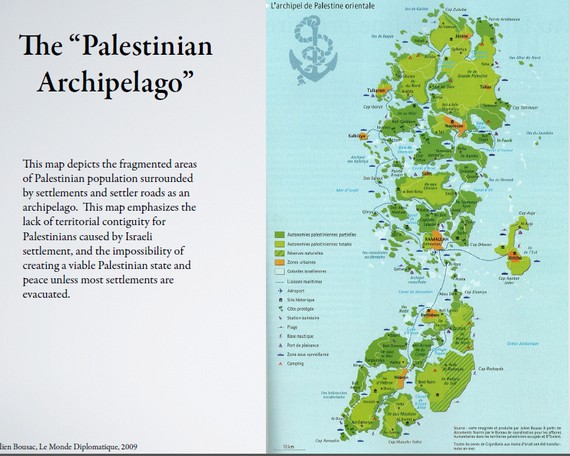The new apartheid

http://www.nimn.org/articles/whats_new/000637.php
What the UN rapporteur has concluded has been no secret for quite a while, but some particular factors in the West (especially the US) have remained rather reluctant to name things with their true names - the reasons for which I'm leaving to the audience to analyze for themselves. The point is, even a brief look at the situation in the West Bank calls some stunning memories about the apartheid era, especially in someone who has actually seen it first-hand, even if for a brief period in her early life (thankfully). And, though the statement now comes directly from a UN official, I'm not surprised that I won't be seeing anyone holding their breath about any change in the situation coming any time soon.
There've been two types of buses running through the occupied Palestinian territories for some time. One is for the Israeli settlers, the other for the Palestinians traveling to and from the Israeli-controlled lands. "This is yet another expression of the Israeli apartheid", the Haaretz wrote. But you wouldn't even need to see special segregated buses to reach that conclusion. In its report about the Israeli settling policy in the West Bank, the UN has clearly stated that it bears little to no difference from the apartheid system that used to exist here in South Africa until not so long ago. It possesses the same three main features: institutionalized discrimination; repression; and systematic persecution.
The UN's human rights investigator has confirmed that there are de facto two law systems in existence in the occupied Palestinian territories - one is for the settlers and the other for the Palestinians. The report also says that the Israeli settlers enjoy "a privileged status in contrast to the Palestinians", and in result the human rights of the latter are being systematically violated. The Palestinians are subject to systematic repression. Not only their freedom of movement is severely crippled (which was also one of the main tenets of apartheid), but their freedom of expression and assembly as well. And all of this is being done under the pretense of guaranteeing the safe everyday life of the Israeli settlers. What's worse, the settlers are using violence against the Palestinians, destroying their property, their homes, their schools and their farms with impunity.
Ultimately, the investigator concludes, the systematic violence against the Palestinians is aimed at forcefully driving them off their lands, and dumping them into the most inhospitable areas so that more Israeli settlements could be built on strategic locations (access to fresh water is of particular importance there, and has become a major tool of control and submission). Lots of cases of forceful removals, persecution and confiscation of property have been listed in the report. The Palestinians are gradually getting squeezed into an ever tighter area, their lands now looking more like a tiny archipelago:

While the UN is still cautiously refraining from explicitly using the term 'apartheid', from most of its formulations it becomes clear that Israel's behavior is exactly that. The report points out that the settlements are being constructed solely for the Israelis. They are completely separated from the Palestinian population in the occupied territories. The segregation is enforced through a strict militarized access control (walls, barbed wire, checkpoints, etc), which is a further violation of the civil rights of the Palestinians in their own country. Again, the pretext being the "safety" of the Israeli population living inside.
All of this sounds stunningly familiar to someone who has seen what apartheid in South Africa looked like - like the UN rapporteur himself, and like myself. The parallels are uncanny. And then, it's no surprise that you'd see radicalization among parts of the Palestinian population, and perpetual violence on both sides. Because if someone comes to your place, takes away your property and dumps you in a fenced area somewhere in the rocky wilderness and places armed guards to keep you out of your former home, and all of this with the tacit support of the greatest power in the world (the one claiming to be the paragon of freedom, mind you), you'd want to take the arms too as a last resort, wouldn't you?
Back in the 80s and early 90s, much of the so called "free world" took a firm stand and initiated a massive campaign to put an end to apartheid here in South Africa. We would've still lived inside a fenced archipelago of our own if you guys hadn't done that for us. For which we'll all be forever grateful. But will the world leaders and democratic societies have the courage to take a stand now, in the face of yet another apartheid somewhere in the world? We all know that finding solutions to complicated problems first requires recognition of the problem. So would anyone who matters, and all those who do not matter when alone but who start to matter when they stand together, have the guts to name things with their true names, and admit that what Israel is doing in the occupied Palestinian lands is also apartheid? While I remain somewhat pessimistic about this for the time being, in the long run, something tells me that such injustices cannot persist forever. Ultimately, this issue has to reach its conclusion, one way or the other. Let's hope it'll be the civilized way rather than the violent one. Unless we'd want to see it being solved through the gradual extinction of an entire nation, while the rest of the world watches. "If there's no person - there's no problem", as Stalin once said. If that happens, it would be something for which we'd all deserve the most severe judgment by history.